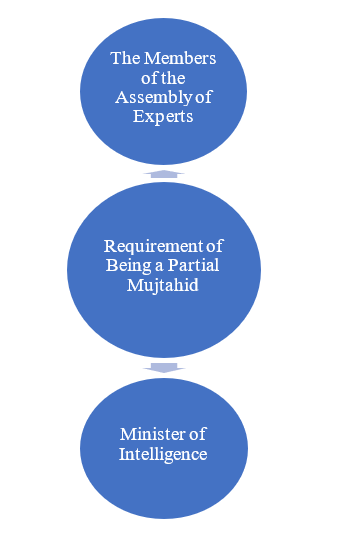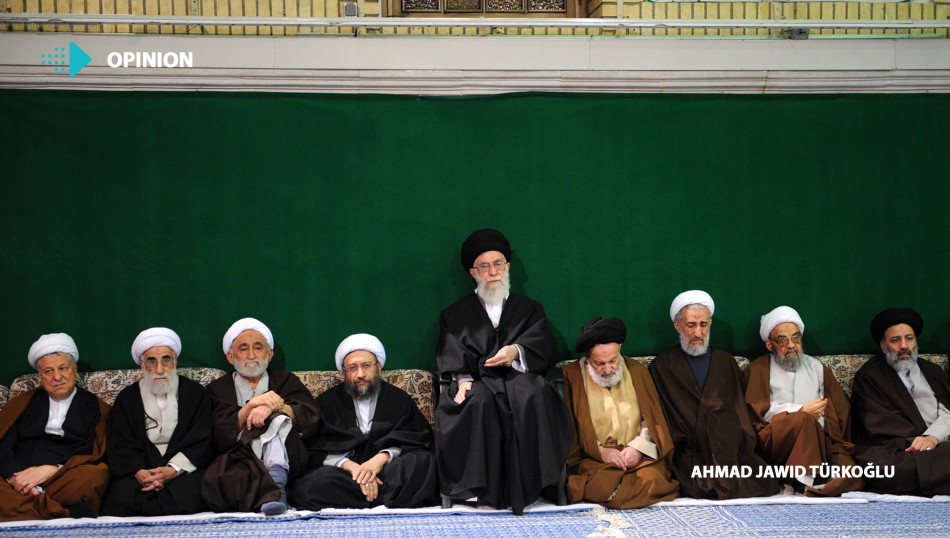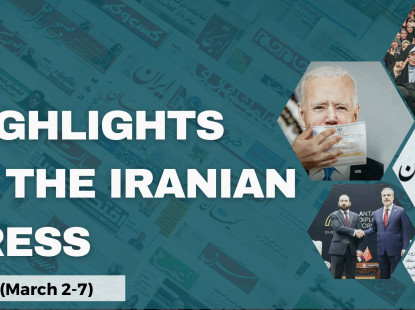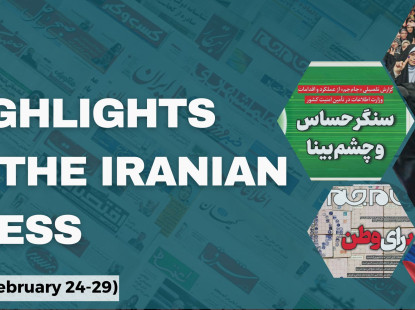Offices in Iran Required Being a Mujtahid
According to the Constitution of the Islamic Republic of Iran and the Iranian laws, 99 officeholders, who will take charge in seven institutions, need to be “mujtahids”. Whereas the appointments to five of these institutions are regulated by the Constitution, “Law on Determining the Terms and Conditions of the Minister of Intelligence” and “Election Law of the Assembly of Experts” determine the appointments of one office, respectively. The five offices, which are regulated by the Constitution, include the Office of Supreme Leader, six faqih members of the Guardian Council, Chief Justice, Prosecutor-General, and the Chief of the Supreme Court. Law on Determining the Terms and Conditions of the Minister of Intelligence designates the conditions for having the office of the Ministry of Intelligence, and Election Law of the Assembly of Experts specifies the criteria for 88 members of the Assembly of Experts. While it is necessary to be “absolute mujtahids1” for the ten offices regulated by the Constitution, it is sufficient for the Minister of the Intelligence and the 88 members of the Assembly of Experts to be “partial mujtahids2”.
The Supreme Leader
The Constitution includes provisions for the Supreme Leader to have “absolute ijtihad.” According to Article 5 of the Constitution, the Supreme Leader needs to be “a just and pious faqih, who is fully aware of the circumstances of his age; courageous, resourceful, and possessed of administrative ability.” On the other hand, Article 109 requires the Supreme Leader to “have the knowledge, as required for performing the functions of mufti in different fields of fiqh.” According to Article 107, the Assembly of Experts elects the Supreme Leader “by designating him as the most knowledgable scholar on the subjects of the fiqh, and political and social issues.” In the 1979 Constitution, the condition for being the Supreme Leader was being the “marja al-taqlid”. However, after the constitutional amendment, being an absolute mujtahid has become sufficient for office. Ali Khamenei, who became the Supreme Leader after Khomeini, neither met the condition of being a marja al-taqlid as it is stated in the 1979 Constitution nor the condition of being an absolute mujtahid, that is specified in the 1989 constitutional amendment. Khomeini was promoted to the status of marja al-taqlid by the state to overcome the problems which were caused by him not being the marja al-taqlid. The majority of the members of the Assembly of Experts acknowledged Khomeini as the marja al-taqlid at the time. Thus, it provided an artificial legitimacy to him.
Except himself, the Supreme Leader directly appoints seven absolute mujtahids and assigns two of them indirectly. Furthermore, he controls all laws and regulations of the country via the right of veto of the Guardian Council’s faqih members. The suitability of the President, members of the Islamic Consultative Assembly, and the Assembly of Experts are also decided by the Guardian Council. In other words, all these institutions and officeholders, who act as the absolute sovereign of Iran, have established a system in which they elect each other.
The Faqih Members of the Guardian Council
According to Article 91 of the Constitution, faqih members of the Guardian Council should be “‘just faqihs, who are conscious of the present needs and the issues of the day”. The same Article also states that these members are appointed directly by the Supreme Leader. In compliance with Article 91, the Guardian Council is obliged to examine the compatibility of the legislation passed by the Islamic Consultative Assembly with Islam and the Constitution. According to Article 96 of the constitution, the determination of compatibility of the legislation passed by the Islamic Consultative Assembly with the laws of Islam rests with the majority vote of the faqih members. In contrast, the determination of its compatibility with the Constitution rests with the majority of all the members of the Guardian Council. On the other hand, Article 4 states that it is the duty of the faqih members to determine the compatibility of “all civil, penal financial, economic, administrative, cultural, military, political, and other laws and regulations with the Islamic criteria”. The Faqih members of the Guardian Council shall evaluate the Assembly's regulations and decisions, as stated in Article 91. Moreover, they also have the authority to check regulations and decisions of every executive, judicial and other state institution to determine their compatibility with the Islamic criteria. Consequently, all these authorities require the faqih members of the Guardian Council to have absolute ijtihad.
Three Judicial Offices: Chief Justice, Chief of the Supreme Court, and Prosecutor-General
Article 163 of the Constitution states that “the conditions and qualifications to be fulfilled by a judge will be determined by law, in accordance with the criteria of fiqh.” This Article requires judicial office holders to be faqihs. According to Article 157, “in order to fulfill the responsibilities of the judiciary power in all the matters concerning the judiciary, administrative and executive areas, the Supreme Leader, shall appoint a just mujtahid well versed in judiciary affairs and possessing administrative abilities as the head of the judiciary power for a period of five years.” This office represents the highest authority in the judiciary. On the other hand, Article162, states that “the Chief of the Supreme Court and the Prosecutor-General must both be just mujtahids well versed in judicial matters. They will be nominated by the head of the judiciary branch for a period of five years, in consultation with the judges of the Supreme Court.” Therefore, the top-level people in Iran’s judiciary are mujtahids. It is an obligation for the holders of these offices to have absolute ijtihad.
Figure 1: The Offices With the Requirement of an Absolute Mujtahid

Source: Prepared by İRAM experts.
Members of the Assembly of Experts
Members of the Assembly of Experts are nominated among the “faqihs who possess knowledge on religious issues as well as political and social issues at the level of partial ijtihad, and they are elected by the people. There is no provision in the Constitution concerning the members of the Assembly of Experts to have ijtihad. Nonetheless, Article 3 of the Election Law of the Assembly of Experts requires the members to have ijtihad. According to this Article, the conditions for being a member of the Assembly of Experts are as follows:
- Being reliable and moral people, who are known for their religiousness,
- Having the competence to make ijtihad on some fiqh issues and the knowledge to determine the Velayat-e Faqih for the office of Supreme Leader,
- Having political and social foresight and being familiar with the contemporary issues,
- Being faithful to the order of the Islamic Republic of Iran,
- Not having a bad political and social background.
There is no legal provision to prevent Sunnis or women from being nominated for the Assembly of Experts, which consists of 88 members. Whereas the Guardian Council approves the candidacy of Sunni faqihs, who do not have a controversy with the Islamic Republic of Iran, it insistently rejects the candidacy of the women members, who are “at the level of ijtihad”. While there is no woman among the current members, Sunnis are represented by two people (Ali Ahmad Salami and Faegh Rostami). The Assembly of Experts, which has the authority to elect and dismiss the Supreme Leader, is completely controlled by the Supreme Leader via the Guardian Council. Thus, it has been turned into a shadow Assembly.
The Minister of Intelligence
According to Article 133 of the Constitution, ministers are appointed by the President and subjected to the vote of confidence in the Assembly. Unlike other ministers, the appointment of the Minister of Intelligence is subjected to a unique legal condition. According to the Law on Determining the Terms and Conditions of the Minister of Intelligence, the Minister has to fulfill the condition of being a mujtahid. The relevant law requires the Minister of Intelligence to "hold a degree in ijtihad, be a just person, have taqwa, possess a bright political and management background, and abstain from membership in any political party or group.” Considering the conditions mentioned in the relevant law, the Minister of Intelligence needs to have an education on the level of partial ijtihad.
Figure 2: The Offices With the Requirement of a Partial Mujtahid

Source: Prepared by İRAM experts.
Evaluation
Currently, it is argued that people, who hold the relevant offices, are appointed without fulfilling the legal requirement of being a mujtahid. Several clerics believe that the ijtihad is singular and the issue of absolute-partial ijtihad in Iran is a fabrication to prevent ghaht-e rejal (lack of qualified personnel in state administration). People, who will be appointed to the offices that require being an absolute mujtahid, must be Shiite, male, a cleric who received education in the basin of knowledge, known for his religiousness, “trustworthy and ethical”, and faithful to the order of the Islamic Republic of Iran. Even though there is no legal provision to prevent Sunni and woman candidates for the offices that require being a partial mujtahid, the representations of the Sunnis are limited in practice, while women have no representation at all.
The Islamic Republic of Iran, which established a unique political-administrative system, is following a significantly different path from the universal law, order, and understanding in ascending to positions in the political arena. In Iran, an individual has to comply with not objective but subjective criteria to ascent to an administrative office. It is not clear what is meant by the requirements stated above, such as "being religious and not having a bad political and private life”. Moreover, these criteria pave the way for inconclusive discussions. In every election period, numerous candidates are deprived of the right to attend the election due to the claims that they do not meet these subjective conditions. It causes the turnout rate to decrease regularly.
The rate of the Sunni representation, which forms 10% of the population in the country, is 2% in the mentioned offices. Imposing subjective criteria, which is interpreted in different ways by different people, to reach administrative positions results in systematic discrimination towards citizens, who do not prefer to adopt a lifestyle in line with these criteria. It causes a significantly low turnout rate in the election of the Assembly of Experts. The widespread veto of candidates for nomination by the Presidency and Islamic Consultative Assembly makes low turnout rate inevitable and roots for the distrust of people towards the system.
1 A mujtahid who does not imitate another mujtahid in the method and details and has absolute ijtihad.
2 A mujtahid who has knowledge at the level of ijtihad on some issues of fiqh.











